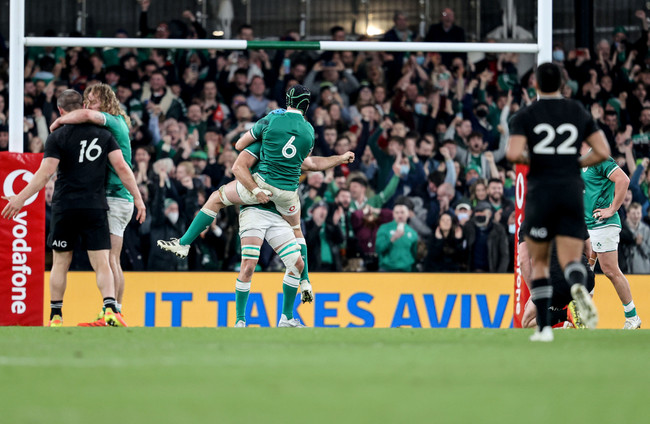LET THE HYPE begin. Ireland are going to win the next World Cup. Print those commemorative t-shirts, book your flights to Paris. What can go wrong?
Well, we all know the answer to that.
We’ve been here before, remember. November, 2002. World champions Australia were taken down in the autumn rain. A year later, Ireland crashed out in the World Cup quarters. Fast forward four years. This time it was both Australia and South Africa who lost in the November Series. Dark horses for the tournament? By the time 2007 came around, Ireland bore a closer resemblance to Desert Orchid.
Onto 2019. They’d beaten New Zealand twice in the previous World Cup cycle but when it mattered most, they choked in Japan. So start the hype machine now? Perhaps we should instead take a dose of perspective.
That was sorely missing earlier this year when people were calling for Andy Farrell’s head. The coach, after all, had lost to Wales and France, his side struggling to a win over Scotland, months after they had played shockingly against Georgia. Without credit in the bank, fans, pundits, journalists, loudly wondered if he was the man to bring the team forward.
Today he answered them.
They were magnificent, Ireland, marrying the best of the Schmidt philosophy with the Farrell theory. We don’t have a name yet for this new strategy but we certainly like it, the Schmidt-obsessed attitude to the breakdown, his emphasis on accuracy coupled with Farrell’s offer of freedom to his players in attack.
Never have New Zealand looked so average against Ireland before. Then again, Ireland didn’t allow them be anything else. Caelan Doris was immense, Jamison Gibson-Park equally so, Andrew Conway superb. Throw in Andrew Porter, James Lowe, Ronan Kelleher and Tadhg Furlong’s names to this list of stars. Each had games to remember.
Most of all, though, we’ll remember what we witnessed and heard at the end, the fifth chorus of The Fields of Athenry, the fans staying in the stands and applauding both teams off the field and thoughts briefly turned back to the memory of those dark, horrible days when the world shut down and we all stayed indoors and wondered when, if ever, we’d see a day like this again.
It wasn’t just the result, it wasn’t just the brilliance of the display, it was much more personal than that. It was like being a kid on Christmas day again, unwrapping one present after the next.
First, James Lowe’s try, superbly executed yet made by his fellow Leinster man, Gibson-Park, whose decision making and passing stretched the New Zealand defence, first to the left, then the right, creating the space that allowed Hugo Keenan to spin the most wonderful of passes into Lowe’s range. He did the rest.
Next to the spirited comeback. Ireland had left nine points behind them in the first half, obsessively going to the corner when the more sober choice of a kick at goal would have sufficed. They should have been ahead, instead they trailed.
Yet it didn’t matter. For so long we’ve listened to Farrell harp on about ‘heads up rugby’ and we’ve wondered where the detail was to accompany that kind of chat. It all sounded so unconvincing but on 50 minutes and 56 seconds, we saw the philosophy transferred from a textbook to the pitch as Doris spotted the lack of numbers in the New Zealand midfield and raced through the gap to score.
If that was a decisive moment, other ones followed. There was the 55th minute decision to go for the posts rather than the corner and make it a ten-point game; there was the calmness not to panic after New Zealand’s Will Jordan scored a try out of nowhere to reduce that gap; there was the composure of Joey Carbery and Finlay Bealham, who each replaced Ireland’s leaders, Sexton and Furlong, with 16 minutes remaining.
Just as we’ll never forget the roar at the end, we’ll also remember the silence on 68 minutes when Akira Ioane touched down for a try. Silence turned to a raucous cheer when it was crossed off for a forward pass.
The noise lasted to the end, The Fields of Athenry getting one more airing, after New Zealand closed the gap to three; the roars reaching neighbouring postcodes when Lowe nailed Ioane on 73, Carbery kicking that penalty from half-way to make it 26-20.
It got better and better. Keith Earls put in a tackle that a man his size shouldn’t have been able to; Porter sprinted 40 yards across the pitch to support him. Porter by the way is a prop. This was the 74th minute. That’s why Ireland won because they played without ego and played for each other.
Of course it helps if you have replacements like Tadhg Beirne and Peter O’Mahony to come off the bench, it helps when Carbery holds his nerve and kicks his goals and it helps when you look up into the stands and you see 53,000 people wishing you well and cheering you on.
The game had been over for almost 15 minutes, but they lingered proudly in the stands.
The applause clattered across the stadium, the flags began to wave again, the songs of praise were sung and no one was in a hurry to shuffle off, en masse, to the Dublin bars. They wanted to stay because they yearned for a day like this, an Irish performance to be proud of, a game where you could cheer and laugh and scream just like you did in pre-covid days.
The scenes at the end were joyous, the presence of the players’ children on the field as they completed the lap of honour leading to another explosion of decibels.
Christmas day arrived in November.




